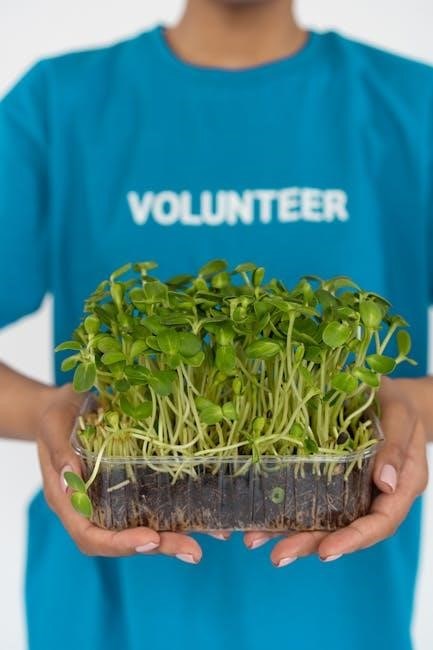Empowering young individuals to navigate the journey of adolescence with confidence and resilience, fostering self-awareness, and embracing personal growth for a brighter future.
1.1 Understanding the Journey of Adolescence
Adolescence is a transformative phase marked by physical, emotional, and social changes. It’s a time of self-discovery, where individuals navigate identity, independence, and relationships. Challenges like peer pressure and body changes can feel overwhelming, but they also offer opportunities for growth. Learning to communicate effectively and build confidence is crucial during this stage. Understanding that adolescence is a journey of trial and error can help ease the pressure. Embracing these changes with curiosity and resilience fosters a strong foundation for future success. Remember, it’s okay to seek support and learn from experiences—both successes and setbacks shape who you become.
1.2 Importance of Self-Awareness
Self-awareness is a cornerstone of personal growth, enabling individuals to recognize their strengths, weaknesses, and emotions. It fosters empathy and understanding, helping girls navigate relationships and challenges with confidence. By practicing self-reflection, young individuals can develop a clearer sense of identity and make informed decisions. Self-awareness also promotes emotional resilience, allowing them to manage stress and setbacks effectively. Cultivating this trait from an early age empowers girls to embrace their uniqueness and build a positive self-image. It is through self-awareness that they can truly understand their values, goals, and aspirations, setting a strong foundation for a fulfilling and purposeful life.
1.3 Setting Goals for Personal Growth
Setting goals is a powerful way to guide personal growth, helping girls clarify their aspirations and develop a roadmap for achieving them. By identifying short-term and long-term objectives, individuals can break down larger ambitions into manageable steps. This process fosters accountability and motivation, encouraging consistent progress. Celebrating small victories along the way builds confidence and reinforces the importance of perseverance. Whether academic, personal, or relational, goal-setting empowers girls to take control of their development. Using tools like journals or apps can enhance this journey, ensuring goals remain top of mind. Ultimately, setting goals cultivates resilience and purpose, paving the way for a fulfilling life.

Physical Development
Understanding the physical changes of puberty, embracing body positivity, and maintaining health through proper hygiene, nutrition, and exercise are essential for a girl’s journey toward confident growth.
2.1 Understanding Puberty
Puberty marks a significant transition in a girl’s life, typically beginning between ages 9 and 14. It’s a time of profound biological changes, including the onset of menstruation, breast development, and rapid growth spurts. Hormonal shifts can lead to emotional fluctuations, such as mood swings and heightened sensitivity. Understanding these changes is crucial for embracing them confidently. Education about proper hygiene, especially menstrual care, is essential. Emotional support from family and friends helps navigate this journey. Remember, these transformations are natural and pave the way for future health and well-being. Seeking guidance when needed ensures a smooth and supported transition into positive young adulthood.
2.2 Hygiene and Self-Care Tips
Practicing good hygiene and self-care is essential during puberty. Showering regularly, using gentle cleansers, and wearing clean clothes helps maintain personal freshness. Skincare routines should focus on balancing natural oils and addressing acne. Hair care involves washing and styling appropriately for your hair type. Menstrual hygiene is crucial—using sanitary products that suit your needs and changing them regularly ensures comfort and health. Additionally, mental well-being is part of self-care; engaging in activities that bring joy and practicing mindfulness can boost confidence. Developing these habits early fosters a lifelong commitment to health and self-respect, empowering you to feel your best every day.
2.3 Embracing Body Positivity
Embracing body positivity involves accepting and loving your body as it is, without comparison to societal standards. It’s about celebrating your unique features and understanding that everyone’s body is different. This mindset helps build confidence and self-esteem, allowing you to focus on your strengths rather than flaws. Rejecting unrealistic beauty ideals and fostering self-acceptance are key steps in this journey. Surround yourself with positive influences that promote body diversity and inclusivity. Remember, your worth is not defined by your appearance but by your character and achievements. Embracing body positivity is a powerful way to cultivate self-love and live a more fulfilling life.

Emotional Development
Navigating emotions during growth involves building self-awareness, emotional resilience, and mental well-being. Understanding and managing feelings effectively fosters confidence and healthy relationships, empowering personal growth and emotional intelligence.
3.1 Building Self-Esteem
Building self-esteem is crucial during adolescence, as it shapes confidence and resilience. Focus on acknowledging strengths, embracing uniqueness, and practicing self-compassion. Surround yourself with supportive individuals who encourage positivity. Engage in activities that bring joy and fulfillment, fostering a sense of accomplishment. Challenge negative self-talk by replacing it with affirmations that celebrate your worth. Learning to accept constructive criticism gracefully and viewing mistakes as growth opportunities can strengthen self-perception; Cultivating self-esteem empowers you to navigate challenges with confidence and maintain a healthy mental outlook, laying a strong foundation for emotional well-being and personal success.
3.2 Managing Emotions and Stress
Managing emotions and stress is essential for emotional well-being. Identify triggers, such as school pressure or relationships, and develop healthy coping strategies. Practice deep breathing, journaling, or talking to trusted friends to process feelings. Engage in physical activities like walking or yoga to reduce tension. Prioritize self-care, ensuring adequate sleep and a balanced lifestyle. Learn to acknowledge and validate emotions rather than suppressing them. Building resilience helps navigate challenges confidently. Remember, seeking support from loved ones or professionals is a sign of strength, not weakness. By mastering emotional regulation, you can maintain harmony and thrive during adolescence.
3.3 Developing Emotional Intelligence
Developing emotional intelligence (EQ) is crucial for understanding and managing your emotions and those of others. Start by practicing self-awareness through reflection and journaling to recognize your feelings. Enhance empathy by actively listening to others and trying to understand their perspectives. Improve communication by expressing your emotions clearly and respectfully. Learn to manage conflicts by staying calm and seeking solutions. Emotional intelligence helps build stronger relationships, navigate social situations, and make better decisions. By cultivating self-awareness, empathy, and effective communication, you can become more resilient and confident in handling life’s challenges. This skill is vital for personal growth and fostering meaningful connections.

Social Development
Social development involves building meaningful relationships, enhancing communication skills, and learning to navigate peer interactions with confidence and empathy, fostering a strong sense of belonging and connection.
4.1 Navigating Friendships
Navigating friendships is a crucial part of social development, involving building trust, communication, and mutual respect. It’s important to identify genuine connections and handle conflicts constructively. Learning to balance individuality with teamwork fosters strong, lasting bonds. Empathy and active listening are key to understanding others’ perspectives, while setting boundaries ensures healthy relationships. Friendships provide support and shared experiences, shaping personal growth and confidence. Nurturing these relationships helps girls develop essential life skills, such as collaboration and emotional intelligence, while also fostering a sense of belonging and joy in their lives.
4.2 Communication Skills
Developing strong communication skills is essential for building meaningful relationships and expressing oneself effectively. Learning to articulate thoughts clearly, both verbally and non-verbally, helps girls connect with others on a deeper level. Active listening, empathy, and clarity are key components of effective communication. Practicing open and honest dialogue fosters trust and understanding, while also encouraging others to share their feelings. Mastering these skills helps girls navigate social situations with confidence, resolve conflicts constructively, and build lasting friendships. Effective communication also empowers them to advocate for themselves and express their needs respectfully, fostering personal growth and stronger relationships in all areas of life.
4.3 Dealing with Peer Pressure
Understanding and navigating peer pressure is a crucial part of growing up. It’s important to recognize when others are influencing your decisions and stay true to your values. Building self-awareness and confidence helps girls resist negative pressures while maintaining healthy friendships. Encourage open conversations about feelings and concerns, and remind them it’s okay to say no. Teaching effective decision-making skills empowers them to make choices that align with their beliefs. Surrounding themselves with supportive peers and seeking guidance from trusted adults can also provide strength. By fostering resilience, girls can handle peer pressure gracefully and grow into independent, thoughtful individuals.

Personal Growth
Personal growth involves consistently improving oneself through self-reflection, goal-setting, and exploring new interests, fostering a mindset of continuous development and self-improvement for a fulfilling life.
5.1 Setting and Achieving Goals
Setting and achieving goals is a cornerstone of personal growth, helping individuals develop purpose and direction. Start by identifying priorities and breaking goals into manageable steps. Create a timeline and track progress to stay motivated. Celebrate milestones to build confidence and maintain momentum. Flexibility is key, as goals may evolve over time. Prioritize self-reflection to align aspirations with personal values. Surround yourself with supportive individuals who encourage your journey. Consistent effort and resilience are essential for long-term success. By setting clear objectives, you empower yourself to grow and achieve a fulfilling life.
5.2 Exploring Hobbies and Interests
Exploring hobbies and interests is a vital part of personal growth, allowing individuals to discover passions and develop new skills. Start by identifying activities that spark joy and curiosity, whether it’s art, sports, or music. Dedicate time to explore these interests, as they foster creativity and confidence. Engaging in hobbies can also build social connections and provide a sense of accomplishment. Encourage experimentation with new experiences to broaden horizons and uncover hidden talents. Remember, hobbies are a powerful way to express individuality and find fulfillment. By embracing diverse interests, you can cultivate a rich and balanced life that reflects your unique personality.
5.3 Importance of Self-Reflection
Self-reflection is a powerful tool for personal growth, allowing individuals to understand their thoughts, feelings, and actions deeply; By regularly examining your experiences, you can identify strengths, weaknesses, and areas for improvement. Journaling or mindfulness practices can help cultivate this habit. Self-reflection fosters self-awareness, enabling better decision-making and emotional resilience. It also promotes accountability and helps in setting realistic goals. Taking time to reflect on accomplishments and challenges builds confidence and encourages a growth mindset. Embrace self-reflection as a journey of discovery and empowerment, leading to a more authentic and fulfilling life. Regular introspection is key to understanding and improving yourself.

Relationships and Boundaries
Building healthy relationships and setting boundaries is crucial for personal well-being. Learn to communicate effectively, respect others, and prioritize trust in all interactions, fostering strong, positive connections.
6.1 Understanding Healthy Relationships
A healthy relationship is built on mutual respect, trust, and open communication. It involves understanding each other’s needs, boundaries, and emotions while fostering a sense of safety and support. Signs of a healthy relationship include active listening, empathy, and the ability to resolve conflicts constructively. Both parties should feel valued and empowered, with neither trying to control nor manipulate the other. Healthy relationships encourage growth, respect individuality, and promote a positive self-image. They are rooted in honesty, kindness, and a shared commitment to nurturing the connection. Learning to recognize and cultivate these qualities is essential for building strong, meaningful relationships throughout life.
6.2 Setting Personal Boundaries
Setting personal boundaries is crucial for maintaining healthy relationships and protecting your emotional and mental well-being. Boundaries are clear limits that define what you are and aren’t comfortable with. They help establish respect, prevent emotional overload, and ensure your needs are prioritized. Communicating your boundaries clearly and assertively is key, whether it’s with friends, family, or romantic partners. It’s important to set both physical and emotional boundaries, such as saying “no” when necessary, respecting your own time, and avoiding situations that make you feel disrespected. Healthy boundaries foster confidence, self-respect, and stronger connections with others, allowing you to grow and thrive in a supportive environment.
6.3 Navigating Family Dynamics
Navigating family dynamics is a key part of growing up, as it shapes your identity and relationships. Family environments can be complex, requiring communication, understanding, and patience. Building strong, respectful connections with parents and siblings involves open dialogue and setting boundaries. It’s important to balance independence with family values, ensuring you honor your roots while developing your own path. Learning to resolve conflicts constructively and showing empathy can foster a supportive home atmosphere. Remember, family is a foundation of love and guidance, helping you grow into a confident and resilient individual prepared for life’s challenges.

Education and Future Planning
Education and future planning are crucial for personal and professional growth, helping girls build skills, set career goals, and prepare for independence with confidence and clarity.
7.1 Academic Success Tips
Achieving academic success requires dedication, organization, and effective study habits. Girls can thrive by setting clear goals, prioritizing tasks, and seeking support from teachers or mentors. Developing a consistent study routine, actively participating in class, and staying organized are key. Encourage critical thinking and creativity to enhance problem-solving skills. Building confidence in public speaking and presentations can also boost academic performance. Additionally, maintaining a healthy work-life balance and staying positive under pressure are essential. By fostering a growth mindset and embracing challenges, girls can overcome obstacles and reach their full potential, paving the way for future success and independence.
7.2 Choosing a Career Path
Choosing a career path is a pivotal decision that shapes future opportunities and personal fulfillment. Girls should explore their passions, strengths, and interests to align with career goals. Self-assessment tools and career counseling can provide clarity. Researching industries, job roles, and required skills helps make informed decisions. Gaining practical experience through internships or volunteer work offers valuable insights. Additionally, staying open to mentorship and networking can open doors to new opportunities. Encouraging girls to embrace their unique talents and pursue fields they are passionate about fosters confidence and long-term satisfaction. By aligning career choices with personal values and aspirations, girls can build a fulfilling and purpose-driven future.
7.3 Preparing for Independence
Preparing for independence is a crucial step in personal growth, equipping girls with the skills and confidence to manage life on their own. This includes developing financial literacy, time management, and self-care routines. Learning to budget, save, and prioritize expenses fosters responsibility. Cultivating practical skills like cooking, cleaning, and problem-solving is essential. Emotional readiness is equally important, involving self-reflection and boundary-setting. Encouraging girls to seek mentorship and build a supportive network helps them navigate challenges. By fostering a mindset of self-reliance and resilience, girls can transition smoothly into independent living, ready to embrace new opportunities and responsibilities with confidence.

Safety and Health
Empowering girls to prioritize their safety and health through education, awareness, and proactive measures, ensuring physical and emotional well-being in all aspects of life.
8.1 Staying Safe Online
Girls should prioritize online safety by adjusting privacy settings, avoiding strangers, and not sharing personal information. Cyberbullying can be addressed by reporting incidents and seeking support. Using strong passwords and keeping devices updated helps protect against threats. Balancing online activities with real-life interactions ensures mental well-being. Parents and educators play a key role in educating girls about digital safety. By being mindful of online behavior and its consequences, girls can navigate the internet confidently and responsibly, safeguarding their personal and emotional well-being in the digital world.
8.2 Understanding Sexual Health
Understanding sexual health is crucial for young girls, involving education on puberty, hygiene, and consent. Learning about menstrual cycles, reproduction, and protection against STIs empowers girls to make informed decisions. Open conversations with trusted adults or healthcare providers foster a safe environment for questions. Emotional readiness for relationships should be emphasized, ensuring mutual respect and clear communication. Access to reliable resources and support systems helps navigate this sensitive topic confidently. Prioritizing both physical and emotional well-being ensures a healthy approach to sexual health, equipping girls with the knowledge and confidence to protect themselves and their futures.
8.3 Avoiding Substance Abuse
Avoiding substance abuse is vital for a healthy and successful journey through adolescence. Understanding the risks of drugs and alcohol, such as impaired judgment, health issues, and addiction, is key to making wise choices. Peer pressure can be challenging, but building strong self-esteem and surrounding oneself with positive influences helps resist temptation. Encouraging open conversations with trusted adults or counselors can provide guidance and support. Engaging in hobbies, sports, or creative activities offers healthy outlets for stress and emotions. Educating oneself about the consequences of substance abuse empowers girls to prioritize their well-being and future goals, fostering a path to a substance-free, fulfilling life.
Celebrating growth, embracing challenges, and stepping into the future with confidence. Empowering girls to become resilient, self-aware, and compassionate individuals, ready to thrive in life’s journey.
9.1 Celebrating Growth and Achievements
Celebrating growth and achievements is a powerful way to recognize progress and build confidence. Reflecting on past challenges and accomplishments helps girls understand their resilience and strength. Acknowledging milestones, no matter how small, fosters a sense of pride and self-worth. This practice encourages girls to embrace their journey, celebrate their uniqueness, and honor their efforts. By doing so, they gain the courage to pursue future goals and face new challenges with optimism. Recognizing achievements creates a positive mindset, empowering girls to take pride in their personal and emotional development.
9.2 Embracing the Future with Confidence
Embracing the future with confidence is a key aspect of personal growth. Girls should view each experience as an opportunity to learn and evolve. Building self-esteem and emotional intelligence equips them to face challenges head-on. By setting clear goals and maintaining a positive outlook, they can navigate life’s uncertainties with assurance. Encouraging independence and resilience helps girls feel prepared for whatever lies ahead. Celebrating their achievements and learning from setbacks fosters a strong foundation for future success; With confidence, they can pursue their passions and create a fulfilling life, ready to embrace new opportunities and challenges with courage and determination.
9.3 Final Thoughts on Growing Up
Growing up is a journey of self-discovery, growth, and resilience. It’s essential to embrace change, learn from experiences, and cultivate a positive mindset. Girls should prioritize self-care, nurture meaningful relationships, and stay true to their values. By fostering confidence and emotional intelligence, they can navigate life’s challenges with grace. Remember, growth is lifelong, and every step forward is a celebration of progress. Surround yourself with supportive people, embrace your uniqueness, and continuously strive to become the best version of yourself. With determination and self-love, the future holds endless possibilities for empowerment and success.

Leave a Reply
You must be logged in to post a comment.